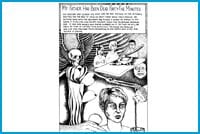What happens when you put performance poet Daphne Gottlieb and Hothead Paisan-creator Diane DiMassa in a room together? Mind-blowing punkrock lit. When they collaborate on a graphic novel like Jokes And The Unconscious, the result is a startling mixture of words and visuals, a disarming, honest look at love and loss.
Jokes And The Unconscious is named for Sigmund Freud’s 1905 tome Jokes And Their Relation To The Unconscious in which he analyzes the human need for comic relief. Throughout their book, Gottlieb and DiMassa tells jokes that are sometimes funny, often offensive or corny, and always strangely necessary. Their off-colour humour runs like a lifeline beneath the tragedies of life.
Sasha, a young college student, has a summer job at the hospital where her recently deceased father used to work. Ironically, her oncologist father died of cancer. But he made sure his daughter was employed before he went. Sasha has to deal with her grief while working in patient billing, a depressing and boring job that entails getting signatures and informing people about the high costs of healthcare.
To pass the time, Sasha looks up everyone she has ever known on the hospital computer, uncovering sometimes shocking information. A friend has been bashed but never told her, an old boyfriend has penile warts, a kid she used to play with has epilepsy. Also shocking are the things she learns about hospitals: insurance doesn’t apply to failed suicides; mentally challenged patients get physically restrained; everyone loses their identity in those little green gowns.
Despite the daily horrors, Sasha is falling in love with Jet, an adorable skater girl. The harshness of the hospital is balanced by the tenderness between the two women, and the hot, healing sex they have in Sasha’s apartment.
Jokes And The Unconscious delves into the complexities of love and the difficult losses of complicated relationships. Neither Gottlieb nor DiMassa are afraid of looking at the ugly — in others, in the world and in themselves. How do you grieve for someone you’re furious with? How do you live with your own apathy? How do you forgive others and yourself, then move on?
Gottlieb writes searing poetic monologues and brings her characters to life with dialogue that rings true. She’s a mesmerizing writer who finds meaning in the mundane without slipping into the maudlin. A simple thought on a plane, “This is what it feels like to put your seat back into the upright position without a father,” haunts the reader in a way that no typical breakdown scene could.
DiMassa’s illustrations are a perfect complement to Gottlieb’s words. She captures pain in a striking and surreal way, embracing the primal and depicting people like the wild animals we sometimes are. As always, she portrays women at their fiercest, sexiest and nastiest. She also adds a touch of humour to the hospital, with such scenes as a William Tell victim in the waiting room with an apple still on his head and an arrow through his eye.
Together, Gottlieb and DiMassa capture the absurdity of both life and death, and take their readers on a hilarious and unforgettable journey into our own vulnerability. Let’s hope this isn’t their last collaboration.

 Why you can trust Xtra
Why you can trust Xtra


